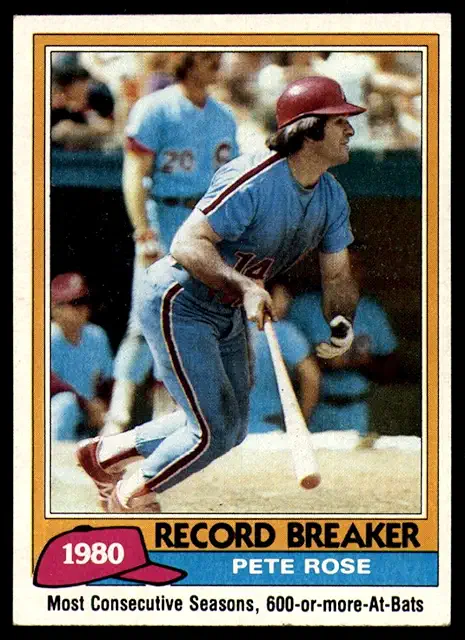Pete Rose deserves immortality: Put him in the Hall of Fame
The last time I saw Pete Rose, he was spitting in the eye of major league baseball. The lords of the game thought they were barring him from their Hall of Fame? Hah! There was Rose, in baseball’s most sentimental hour, perched on the sidewalk outside the main entrance of the Hall, daring everybody to challenge his right to be there.
Did baseball’s rulers think they’d shame Rose into hiding in some dark corner just because they’d declared him an outlaw? Fat chance! On the weekend the game was inducting its 1996 class of honorees – including the Baltimore Orioles manager, Earl Weaver and pitcher Jim Bunning – there was Rose, signing autographs (for money), and standing his ground as thousands of fans flooded the streets of Cooperstown, N.Y.

He goes to his grave now, at 83, with the game’s statistics covering him like a glow, but so much lingering controversy that his life ends with baseball continuing to declare him a pariah.
So, who’s right?
Rose, thinking he deserves immortality just because he stroked more hits, and played more games, than anyone in the history of the game?
Or baseball itself, barring him from Cooperstown’s most hallowed hall because he gambled on his own team while managing the Cincinnati Reds, and lied about it, and called into question the sport’s essential integrity?
As Rose departs, he leaves behind some indelible images. There he was, diving head-first through the air, both arms extended – not as if diving into a pool of water, but more like Superman himself flying through the air to stretch a line drive into a triple.
There he was, oblivious to all pain and all sense of protection, to knock down a catcher named Ray Fosse, so mercilessly that it ruined Fosse’s career, to win an All-Star game.
There he was, the night he broke Ty Cobb’s record for most hits in a career, sobbing convulsively in front of a national television audience.
Few men played baseball harder than Rose, nor loved it more openly, nor gloried in his accomplishments as he rewrote the game’s storehouse of hitting records.
As he goes to his grave, Rose leaves behind images covered in dust and glory. He was a fabulous hitter of baseballs who lived by his own rules, which were not always the same as baseball’s dictates.
So he’s eternally barred from the big room of plaques at the Hall of Fame. There are plenty of Rose artifacts sprinkled about the museum’s many rooms, a testament to his record-breaking 4,256 hits, for example.
But no inclusion with the game’s immortals, in the big room where they show off the brass plaques listing all the fundamental facts of eternal greatness.
On all those plaques, there’s not a word about human weakness, on or off the field. It’s a Fantasyland of white-washed greatness. It’s all home runs and batting average, strikeouts and shutouts and other gaudy statistics.
Nothing about Ty Cobb’s racism, nothing about Tris Speaker’s KKK connections, nothing about the scores of boozers, or the guys who took their “greenies,” the amphetamines that enhanced the play of a generation.
The game wishes to bestow a certain purity upon itself.
Pete Rose was never pure – but he was about as pure a competitor as the game ever had. The Hall of Fame ain’t for choirboys, it’s for those who had the skills, the determination, and the sheer toughness, to shine above all others on the playing field.
Do you want toughness and determination? That’s the picture that stays with me – and with thousands who saw Rose that Hall of Fame induction weekend in 1996.
There he was, his face locked into a street-tough scowl, as if daring anybody objecting to his presence to step forward. He was intimidating. One look at him, and you knew how Ray Fosse felt as Rose came barreling into him.
Whatever his off-the-field weaknesses, Pete Rose played the game with toughness, with delight, and with unassailable skill. So tell that story on Rose’s plaque. He gambled on the team he was managing. That was a criminal act, committed after his playing days.
But, boy, could this guy play the game. And that’s why we enshrine people here. Whatever their human flaws, there was greatness on the playing field.

Michael Olesker, columnist for the News American, Baltimore Sun, and Baltimore Examiner has spent a quarter of a century writing about the city he loves.He is the author of several books, including Michael Olesker’s Baltimore: If You Live Here, You’re Home, Journeys to the Heart of Baltimore, and The Colts’ Baltimore: A City and Its Love Affair in the 1950s, all published by Johns Hopkins Press.


The case for Pete Rose being inducted into the Hall of Fame is a compelling one. His incredible talent and achievements on the field are undeniable—he’s the all-time hits leader and a key player in multiple World Series victories. While his gambling scandal looms large, it’s important to consider the context of his career and the impact he had on the game. Many argue that the Hall of Fame should celebrate excellence in baseball, and Rose’s contributions certainly reflect that. It’s time to have a serious conversation about redemption and the criteria for inclusion in such an esteemed institution. He deserves a place among the greats.
Dear Mr. Olesker,
I read your aforementioned article about the late Pete Rose wondering if for the first time in thirty-five plus years somebody would finally make a convincing case why he ought to be re-instated and elected into the Baseball Hall of Fame. Suffice to say, I’m still waiting.
To be honest, I respect the effort you put into writing this, but overall this piece was a jumbled hodgepodge of aimless banality (Ty Cobb’s “alleged” racism), non-sequitur filler (amphetamines) and worship of a golden calf.
Since you’re proudly a Rose guy, tell me why you didn’t proudly include other factual aspects of his life such as his admitting to a sexual/adulterous relationship with a 14 year old girl where in his defense he once said, “I thought she was 16”, or that he served time in federal prison as a convicted felon because his attitude towards paying taxes was, “laws for thee, not for me.” You also conveniently omitted his documented profiting from cocaine sales and lying in person to Commissioner Manfred about still betting on MLB games. That’s in spite of an original condition for reinstatement after receiving his lifetime ban back in 1989: reforming your life; meaning no more betting on MLB games.
Speaking of whom, good luck trying to hoodwink MLB’s chief magistrate into giving Rose full reinstatement based on this “let’s-all-feel-sorry-for-poor-Pete” article.
This essay also says a lot about you as a person to wholly throw away your own reputation singing the praises of a convicted felon/ self admitted child molester/ drug profiteer and serial liar all rolled into one. But who gives a shit right? After all that wasn’t your underage daughter who was sexually molested by this disgusting predator, because to you the more important thing is that he had 4,256 base hits right?
Sorry but to a person with both common sense and a conscience none of Rose’s baseball accomplishments will ever negate the fact that he was a vile human-being worthy of no such prestige or accolades.
Since your article, like # 14 himself, fell dreadfully short of reverence, my recommendation to you going forward is do some much needed soul searching. Start by asking yourself, “Why am I essentially chanting along with the crowd, “We want Barabbas?!” After doing that, write with a convincing point to include relevant and persuasive supporting evidence.
In summary regarding possible reinstatement: Commissioners Giamatti, Vincent, Selig and Manfred, the Baseball Hall of Fame, and I disagree with you. That’s six strikes, he’s out ….permanently.
Believe me there are other Hall of Fame candidates much more deserving of your time, effort, and respect.
G.Varon
I agree with you. Pete Rose lied about his gambling on the Reds for nearly two decades. And, he gambled while he was a player/manager. Rose didn’t come clean about his transgressions until he was convinced it was the only way to get back into baseball and the HoF. Is it possible he was sincere? Maybe, but his admission of his guilt came out in drips, trying to find out how far he had to go admitting his guilt in order to be reinstated.
Now, the MLB, like all sport, are in bed with gambling interests. I look at the Pete Rose ban differently now that baseball and gambling are so intertwined. They want to promote gambling on baseball … but keep Rose ineligible? That might be easy to justify, but is it right?
I’m not going to lose any sleep if Rose stays ineligible or if he gets reinstated. As the MLB has so often reminded us: It’s all about the Benjamins.
I understand your strong opinions on Pete Rose, but the article was focused on his baseball achievements and the debate surrounding his potential reinstatement. I personally believe in separating athletic performance from personal conduct in this particular discussion.
Kind regards,
Julianna